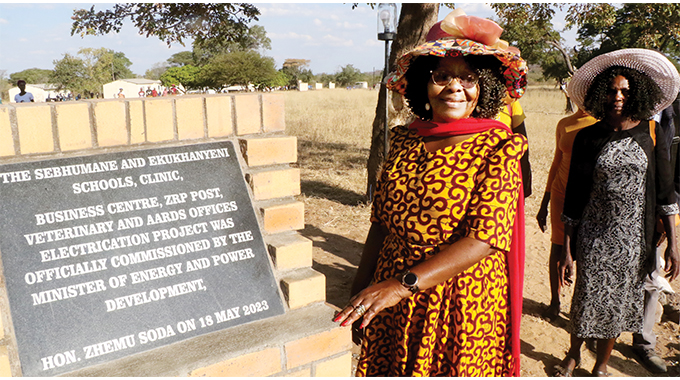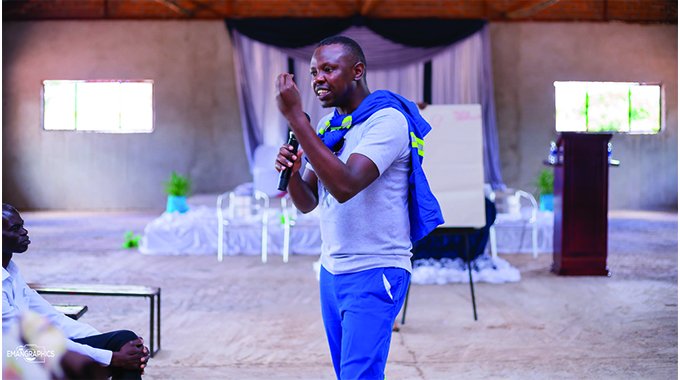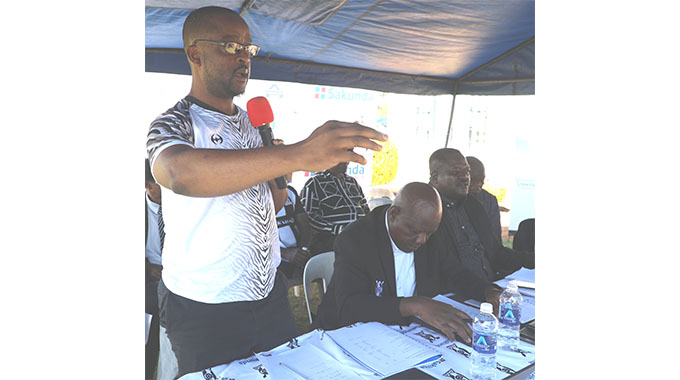No longer ‘komnyam’ ubambile’… rural electrification transforms Nkayi

Peter Matika, [email protected]
THE Sebhumane community in Nkayi North in Matabeleland North province is set for major transformation after the Government facilitated the connection of electricity to its local school, business centre and surrounding homesteads.
The project was successfully implemented by the Rural Electrification Agency (REA) and was handed over to the community last Thursday.
The community joins several other communities that have been connected to power in the district and across the province.
Access to power comes along with numerous benefits such as boosting the teaching of ICTs in schools, enhancing business attraction, luring skilled staff, enhancing service delivery and reducing the cutting down of trees for firewood among others.
To date REA has electrified at least 730 entities in Matabeleland North province alone and these include schools, health institutions, Government offices, villages and chiefs’ homesteads.
Official data shows that so far 252 primary schools, 121 secondary schools, 82 health centres, 57 Government offices, 29 chiefs’ homes, 85 business centres, 16 small-scale farms, 21 villages and 59 other sites have been electrified in the province.
The electrification of Sebhumane Primary School brought joy and jubilation to villagers and development partners who say such projects are highly transformative especially to areas that were lagging behind in terms of development such as Sebhumane.
Energy and Power Development Deputy Minister Magna Mudyiwa presided over the commissioning of the electrification project on behalf of Minister Soda Zhemu and described it as one of the major projects implemented by the Second Republic.

Min Sthembiso Nyoni at Sebhumane
“Rural electrification programmes being implemented by the Second Republic have been very successful and have transformed people’s lives,” she said.
Deputy Minister Mudyiwa said the cost-benefit analysis of such programmes must consider not only the direct impact of the programmes but also their positive externalities.
Nkayi North legislator who is also Minister of Women Affairs, Community, Small and Medium Enterprises Development, Dr Sithembiso Nyoni, said the project would help bridge the gap between rural and urban areas mainly in education.
She said the electrification of the school enables it to run various income-generating projects that will contribute to its development.
“This will not only see the school benefiting but the nearby community as well. It’s important for affordable electricity to reach all the corners of the country to ensure economic and social development,” said Dr Nyoni.
She said this is in line with the National Development Strategy as envisioned by President Mnangagwa.
Dr Nyoni said it was encouraging to note that despite the economic challenges faced by the country, REA has continued to register meaningful progress in the electrification of rural areas.
“The provision of electricity in rural areas will no doubt lead to the empowerment of communities, alleviate poverty, build capacity and create employment, which will lead to sustainable development of communities,” she said.
Minister Nyoni said the rural electrification programme has the potential to improve the quality of life of rural communities.
“Many schools across the country are now electrified and have access to the internet hence rural schools are now retaining teachers, unlike in the past,” she said.
Minister Nyoni said by implementing such projects, Zimbabwe was on course to attain a middle-income economy by 2030.
“The importance of electricity as an enabler for economic and social development cannot be over-emphasised. We want to see the community and those surrounding embarking on irrigation, agricultural and poultry projects,” she said.
Dr Nyoni also applauded Government efforts in electrifying the nation as it will reduce child mortality rates in rural areas.
“At rural health centres electricity has brought positive changes. Child mortality rates have been reduced and expectant mothers who were asked to bring their own candles or paraffin lamps to the clinics, are now giving birth in well-lit and conducive environments,” she said.
Minister Nyoni said clinics in rural areas can stock drugs because they now have refrigeration facilities.
She also urged villagers to shun crime and protect electricity infrastructure from vandalism.
Villagers that attended the commissioning ceremony said Government had transformed their lives.
Cde Elvis Moyo, a Zanu-PF Councillor from Sikhobokhobo Ward 12 said the electrification will improve the livelihoods of communities.

Information Technology – Image taken from Shutterstock
He said communities will start income-generating projects to counter climate change.
“As we are now electrified, we want our communities to embrace technology. We want to see our children benefiting from the internet,” said Cde Moyo.
A villager from the same ward Mrs Zanele Ncube-Sibanda said she was happy that Nkayi was being developed.
“We can now start vocational training programmes for those that have completed secondary education,” she said.
Another villager who identified himself as MThe ongoing countrywide rural electrification programme is guided by the Rural Electrification Master Plan, which was adopted by the Government in 2016.












Comments